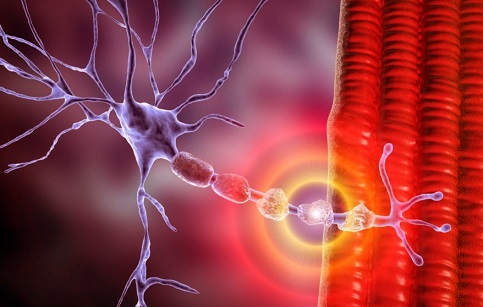Nikhil Prasad Fact checked by:Thailand Medical News Team Nov 30, 2024 4 months, 1 week, 6 days, 8 hours, 12 minutes ago
Medical News: Small fiber neuropathy (SFN) is a condition caused by damage to the body’s thin nerve fibers, which manage sensations like pain and temperature as well as involuntary functions such as heart rate and digestion. People with SFN often experience burning sensations, pain, or trouble standing due to nerve damage. In recent years, small fiber dysfunction has also been increasingly reported among patients with Long COVID. Long COVID encompasses a wide range of symptoms that persist after initial recovery from a COVID-19 infection.
 NK Cell Genes and the Mystery of Long COVID Small Fiber Neuropathy
NK Cell Genes and the Mystery of Long COVID Small Fiber Neuropathy
The connection between these nerve issues and Long COVID is still being explored. Researchers from the Medical University of Vienna in Austria have conducted a groundbreaking study to examine whether genetic factors in natural killer (NK) cells, key players in our immune system, are involved in these conditions. NK cells help in fighting infections and maintaining nerve health. This
Medical News report delves into the study findings to understand how specific genetic traits might contribute to small fiber dysfunction linked to COVID-19 and other causes.
The Study Setup
The research included three distinct groups: 50 Long COVID patients experiencing small fiber dysfunction after COVID-19 infection, 27 patients diagnosed with SFN before the pandemic (prepandemic SFN), and 320 healthy individuals as controls. By analyzing genetic markers related to NK cell functions, the researchers aimed to determine whether certain gene variants played a role in small fiber damage in these conditions.
Key Genetic Markers Explored
The team focused on specific genetic traits related to NK cells, particularly those affecting their activation. These included:
-NKG2C: A receptor on NK cells that aids in detecting and eliminating stressed or infected cells. Some individuals have a deletion of the NKG2C gene, which reduces NK cell activity.
-HLA-E: A molecule that interacts with NKG2C to control NK cell responses. Variants of HLA-E can affect how effectively the immune system detects threats.
-FCGR3A and rs9916629: Genetic markers involved in antibody-dependent immune responses and NK cell populations, respectively.
Researchers also assessed the participants’ exposure to human cytomegalovirus (HCMV), a common virus known to shape NK cell responses, as previous HCMV infection tends to boost the effectiveness of the NKG2C pathway.
The Findings
The study produced several noteworthy results:
-NKG2C Gene Deletion and SFN Risk:
Prepandemic SFN patients were significantly more likely to have the NKG2C gene deletion compared to Long COVID patients and healthy controls. Nearly 84% of prepandemic SFN cases showed impaired NKG2C activity, either due to gene deletion or lack
of prior HCMV exposure.
In contrast, only 52% of Long COVID patients exhibited low NKG2C activity, suggesting that other factors might be at play in Long COVID-related nerve damage.
-HLA-E Variants and NK Cell Responses:
Unlike NKG2C, the distribution of HLA-E variants was similar across all groups. This indicates that HLA-E differences might not contribute significantly to SFN or Long COVID.
-No Significant Role for FCGR3A and rs9916629 Markers:
Genetic differences related to these markers did not show any association with small fiber dysfunction in either Long COVID or prepandemic SFN cases.
-Autoimmune Activity and Long COVID:
Screening for autoantibodies, which can attack the body’s own tissues, revealed no substantial differences between groups. This suggests that autoimmune mechanisms are not a primary cause of Long COVID-associated small fiber dysfunction.
Implications of the Results
The findings highlight a significant difference in the genetic and immune mechanisms underlying small fiber dysfunction in Long COVID versus prepandemic SFN. Specifically:
-In prepandemic SFN, impaired NKG2C-mediated NK cell responses seem to play a central role. This could hinder the immune system's ability to repair nerve damage or control autoimmune activity, leading to nerve dysfunction.
-Long COVID-associated nerve damage appears to stem from a different process, possibly related to inflammation triggered by the SARS-CoV-2 virus rather than genetic predisposition.
Study Limitations and Future Directions
While the study offers critical insights, it has some limitations. For instance, small fiber dysfunction in Long COVID patients was primarily diagnosed based on symptoms, with only 30% undergoing confirmatory skin biopsies. Additionally, the research didn’t investigate large-fiber involvement, which could affect the interpretation of the results.
Future studies should explore other potential mechanisms, such as cytokine-mediated inflammation, and assess larger, more diverse populations to confirm these findings. Tailored therapies targeting specific genetic or immune pathways could be developed to address different forms of small fiber neuropathy more effectively.
Conclusion
The study sheds light on the complex interactions between genetic predisposition, immune regulation, and nerve health. While Long COVID and prepandemic SFN share similar symptoms, their underlying causes appear to differ significantly. In prepandemic SFN, impaired NK cell responses due to genetic factors like the NKG2C deletion play a critical role. In contrast, Long COVID-associated nerve dysfunction might result from post-infectious inflammatory processes rather than genetic predispositions.
Understanding these distinctions is vital for developing targeted treatments and improving the quality of life for individuals affected by these conditions. By continuing to unravel the mechanisms behind small fiber dysfunction, researchers hope to offer new hope to patients struggling with these debilitating conditions.
The study findings were published in the peer-reviewed Journal of Medical Virology.
https://onlinelibrary.wiley.com/doi/10.1002/jmv.70091
For the latest COVID-19 News, keep on logging to Thailand
Medical News.
Read Also:
https://www.thailandmedical.news/news/covid-19-infection-and-vaccination-causes-small-fiber-neuropathy
https://www.thailandmedical.news/news/covid-19-news-study-shows-that-sars-cov-2-infections-can-cause-acute-phrenic-neuropathy-and-diaphragmatic-dysfunction
https://www.thailandmedical.news/news/washington-university-study-reveals-that-sars-cov-2-infections-increases-occurrences-of-peripheral-neuropathy-symptoms-and-pain
